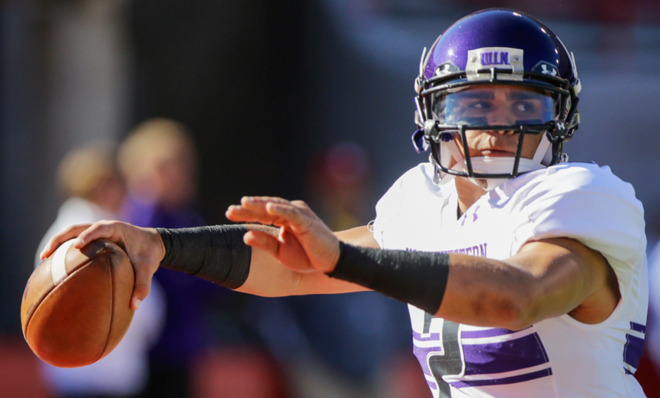Will college sports become unionized?
A group of Northwestern athletes is trying to unionize. But don't expect it to revolutionize the NCAA anytime soon.


A free daily email with the biggest news stories of the day – and the best features from TheWeek.com
You are now subscribed
Your newsletter sign-up was successful
Poor Pat Fitzgerald.
Northwestern University's football coach in 2013 saw his team plummet from a contender on the national stage to a 1-7 Big Ten Conference embarrassment. Then on Tuesday morning, outgoing senior quarterback Kain Colter made his "All Players United" wristband look like a mere fashion statement.
Colter, along with an undisclosed number of his fellow players, signed petition cards asking to be represented by a labor union. Former UCLA linebacker Ramoji Huma submitted those forms to Chicago's regional office of the National Labor Relations Board. Huma and Colter, along with former UMass basketball player Luke Bonner, developed the College Athletes Players Association (CAPA), which would represent the players and operate under the umbrella of the United Steelworkers union.
The Week
Escape your echo chamber. Get the facts behind the news, plus analysis from multiple perspectives.

Sign up for The Week's Free Newsletters
From our morning news briefing to a weekly Good News Newsletter, get the best of The Week delivered directly to your inbox.
From our morning news briefing to a weekly Good News Newsletter, get the best of The Week delivered directly to your inbox.
Full disclosure: I graduated from Northwestern University, and a search through my tweets will turn up plenty of Purple Pride. But as much as I'd like to cheer this historic step my fellow Wildcats are taking, I can't help anticipating some serious roadblocks.
The move is historic, to be sure. This is the first time that college athletes have taken formal steps to be recognized as employees.
That has predictably led to talk about pay-to-play, one of the most controversial issues in college sports. But Huma and Colter are so far steering clear of a salary angle. Instead, CAPA's goals include scholarships that cover the full cost of university attendance, better medical protection (such as covering the cost of surgeries resulting from sports-related injuries), and a trust fund for players whose athletic eligibility runs out before they have completed all the courses needed to graduate.
"We recognize the need to eliminate unjust NCAA rules that create physical, academic, and financial hardships for college athletes across the nation," the group said in a statement.
A free daily email with the biggest news stories of the day – and the best features from TheWeek.com
"A lot of people will think this is all about money; it’s not," Colter told the Chicago Tribune. "We're asking for a seat at the table to get our voice heard."
The NCAA, of course, was having none of it, saying in a statement, "This union-backed attempt to turn student-athletes into employees undermines the purpose of college: An education. Student-athletes are not employees, and their participation in college sports is voluntary."
But what the NCAA thinks may be beside the point. One problem for Colter and Co. is that they aren't even taking on the NCAA. Instead, they're demanding that Northwestern itself recognize the union. If Northwestern chooses not to — and chances are it won't — then a local labor board will hear the case and rule on CAPA's legitimacy.
That would mark just the beginning of a tortuous legal process that could go to the National Labor Relations Board, federal courts, and ultimately — according to Colter, at least — the Supreme Court.
And that's just the start. Spin-off legal cases could address group licensing contracts for broadcasting rights (networks that currently pay schools could in theory be forced to pay CAPA, too) and how male unionization affects Title IX, which prohibits gender discrimination in college sports (CAPA is currently not open to the ladies).
And remember: The guy leading this charge is an outgoing senior. The team's statement directs all NCAA and media inquiries to Colter, and other Norhwestern players "have taken a pledge not to discuss this any further." Those guys don't want to head into spring training with bull's-eyes on their backs, I get that. Colter even touched on that in a Tuesday press conference, asking the NCAA and Northwestern "to not pressure these players." But if you're going to take this historic step, you should be prepared for the inevitable blowback. And leaving your voice to a lame-duck player could lead to problems down the line.
Plus, fun fact: Northwestern is the only private university in the Big Ten. Guess what? The National Labor Relations Act, to which these players are appealing, only has jurisdiction over private enterprises. So even if CAPA wins its appeals and gains legitimacy, it will only apply to other FBS private universities. Athletes at public universities would have to jump through similar hoops if they wanted to emulate the Wildcats, but against their respective states, instead.
Hear that? It's Nick Saban snickering and getting back to his game tape at Alabama.
Sarah Eberspacher is an associate editor at TheWeek.com. She has previously worked as a sports reporter at The Livingston County Daily Press & Argus and The Arizona Republic. She graduated from Northwestern University's Medill School of Journalism.
-
 The ‘ravenous’ demand for Cornish minerals
The ‘ravenous’ demand for Cornish mineralsUnder the Radar Growing need for critical minerals to power tech has intensified ‘appetite’ for lithium, which could be a ‘huge boon’ for local economy
-
 Why are election experts taking Trump’s midterm threats seriously?
Why are election experts taking Trump’s midterm threats seriously?IN THE SPOTLIGHT As the president muses about polling place deployments and a centralized electoral system aimed at one-party control, lawmakers are taking this administration at its word
-
 ‘Restaurateurs have become millionaires’
‘Restaurateurs have become millionaires’Instant Opinion Opinion, comment and editorials of the day
